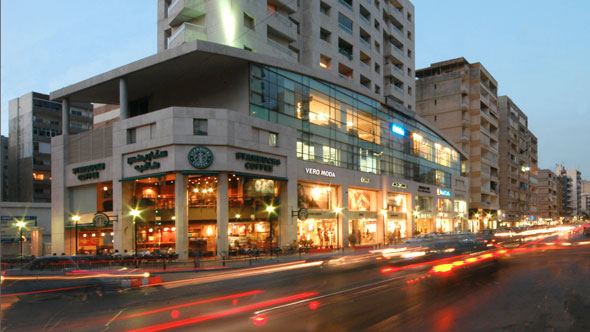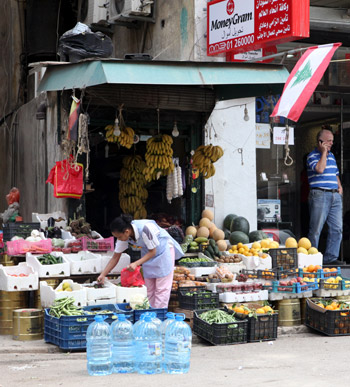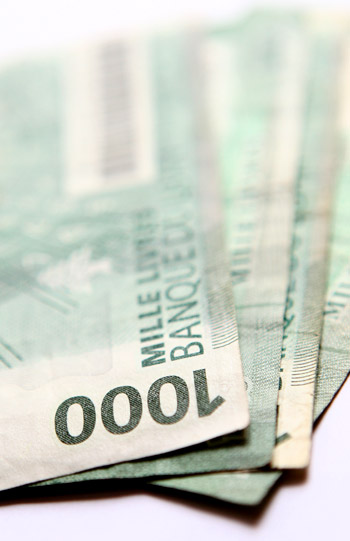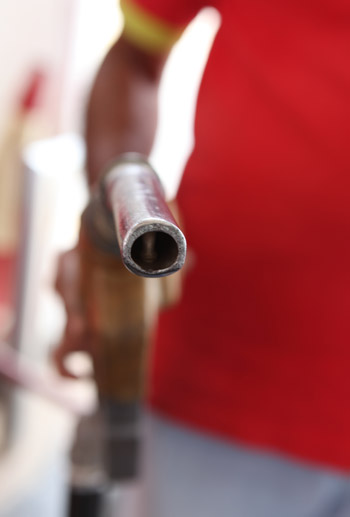
Economy of Lebanon: An Inquiry into Lebanon’s Economic Miracle
Thanks to its resilient, well-educated people, Lebanon has managed to buck numerous regional crises. The country’s economic profile, however, might soon have to be rewritten. The Levant state could soon witness a windfall from offshore by CouponDropDown” href=”http://www.marcopolis.net/economy-of-lebanon-an-inquiry-into-lebanons-economic-miracle-1709.htm#” in_rurl=”http://i.trkjmp.com/click?v=Q0E6Mjg4NTk6MTg5OmJ1c2luZXNzOjg1MTAzMDFjODFjODk1ZWE3MTViNjAzODIzOGFiNzkyOnotMTEyMi0xMDAwOTE6d3d3Lm1hcmNvcG9saXMubmV0OjIzMTE5OjVkMDc1NDE2YWNjOTU0NDI3OWZkNjUyODVmMGIzYTg2″>business with the world, consistently showed the ability to transform the apparent weakness of not “swimming in oil” like Saudi Arabia or Kuwait into an economic strength.
The Lebanon of tomorrow might become a “Kuwait of the Eastern Mediterranean”, but regional peace and stability remain the condition sine qua non to achieve this objective.
|
Lebanon’s economy is based on many pillars.Lebanese banking and trade are the two strongest and well-known segments, whiletourism, industrial production and agriculture are also contributing significantly to the country’s GDP, which stood at around 40 billion U. S. dollars in 2011. What surprises many who are not so familiar with Middle East is the fact that Lebanese wine, entertainment products such as music CDs and Smartphone applications and software have a regional and even worldwide reputation. Media professionals and news presenters from the Levantine state have their footprint at nearly all newspapers, education in order to generate wealth in fields in which other Arab countries are still lagging behind today. As most Lebanese speak Arabic, French and English (many are even fluent in Spanish and Portuguese due to family ties with the strong Lebanese communities in Latin America), Lebanese graduates are the most in demand at international corporations in the Middle East and throughout the world.
Unfortunately, the wounds of the civil war and of several Israeli military attacks on the country are still visible in daily economic life. Once called the Switzerland of the Orient, Beirut’s bank lost its leading position as a hub to other Middle Eastern places like Manama, Bahrain and Dubai as a result of the civil war from 1975 to 1990. However, Beirut’s banks did not disappear from the top of the regional list, as they still payBLOM (Banque du Liban et D’Outre-Mer) or Bank Audi run branches or representative offices worldwide. In 2011, Société Générale de Banque au Liban, or SGBL, took over the Lebanese Canadian Bank for approximately 620 million U. S. dollars. The sound financial system is based on a liberal economic policy with low tax rates on income and corporate profits, a relatively low degree of red tape and low market entry barriers.
Many nationals from Western countries get their tourist and business visas “on arrival” at Rafic Hariri International Airport.
But where there is light, there is shadow. Lebanon’s infrastructure, once the most advanced in the region, was severely damaged and partly destroyed during the civil war, and the construction industry has therefore played a major role over the last two decades. “Our consumption per capita is 1,200 kilos of cement, which is very high; we are 4 million inhabitants. We are consuming almost 6 million tons of cement, which is very high,”Lebanon’s Minister of Economy and Trade H. E. Nicolas Nahas, told Marcopolis in an exclusive interview.
The real estate developer Solidere, an acronym for Société libanaise pour le développement et la reconstruction, played a major role in rebuilding Beirut Central District, which once marked the division line between the Muslim part of West Beirut and East Beirut, the latter controlled by Christian militias.
Solidere is the bellwether share at the Beirut Stock Exchange. The stock’s current sluggish performance (down 10 percent from January to mid-September 2012) reflects market concerns about violent spillover from neighboring Syria, where “insurgents” aim to topple the incumbent President Bashar Al-Assad.
Nevertheless, the government is still following its goal of pushing up the economy, despite a whopping national debt to GDP ratio of 133% (as a comparison: Greece’s debt to GDP ratio stands at 179%, the U. S.’s at 85.5% and Switzerland’s at 20.2%).
The country has also taken steps towards a more flexible economy. “I think there has been a full restructuring of the private sector since the mid nineties, a new management type, a new way of capitalizing, a new approach to quality, new production equipment; I think all of this is now consolidating in new production capabilities,” the Minister said.
Privatization of inefficient state-owned conglomerates, however, is not moving ahead as it should. “The first approach to privatization is looking for financing,” H. E. Nicolas Sehnaoui, Minister of Post and Telecommunications told Marcopolis.
He warned of overestimating the impact of a private Post and Telecom sector. “The main concern is not whether it is in public or private control – in both cases there can be a monopoly and there can be taxes, in which case it is preferable that it is in the hands of the State. The problem is how to prevent a new monopoly from forming, so there needs to be a structuring of the market so there are not two or three giants and another monopoly from which the state must protect the consumer.”
Sehnaoui said that Lebanon has achieved progress in upgrading the speed of the internet in Lebanon. “Internet speeds have multiplied by twelve in the last nine months. The average is 1.35 Mbit/s but this can be increased to 8 Mbit/s with a subscription for individual consumers. For businesses and professionals, we will be announcing a program in the next few weeks for heavy users.”
“Internet speeds have multiplied by twelve in the last nine months. The average is 1.35 Mbit/s but this can be increased to 8 Mbit/s with a subscription for individual consumers. For businesses and professionals, we will be announcing a program in the next few weeks for heavy users.”
Regarding telecoms: “On the 3G network, we have respectable speeds and we are installing HSPA+ which is not much different from 4G and is the latest 3G technology. It will take a few months to reach its full potential because the fiber network is required to reach capacity.”
Light at the end of the tunnel for Lebanon might come from a sector which has yet to be formed: oil and gas. David Rowlands, the CEO of Norway-based Spectrum Company which specializes in estimating carbon energy reserves, said on September 7 that 3-D seismic examinations revealed that Lebanon might have more gas offshore than Syria and Cyprus together. H. E. Energy and Water Minister Eng. Gebran Bassil said recently that some 26 foreign companies expressed interest in starting exploration works in Lebanon’s azure waters in the Mediterranean Sea.
Consequently, on December 3-4 2012, Beirut will host the first Lebanon International Oil and Gas Summit at the prestigious Phoenicia Hotel.
The Lebanon of tomorrow might become a “Kuwait of the Eastern Mediterranean”, but regional peace and stability remain the condition sine qua non to achieve this objective.




